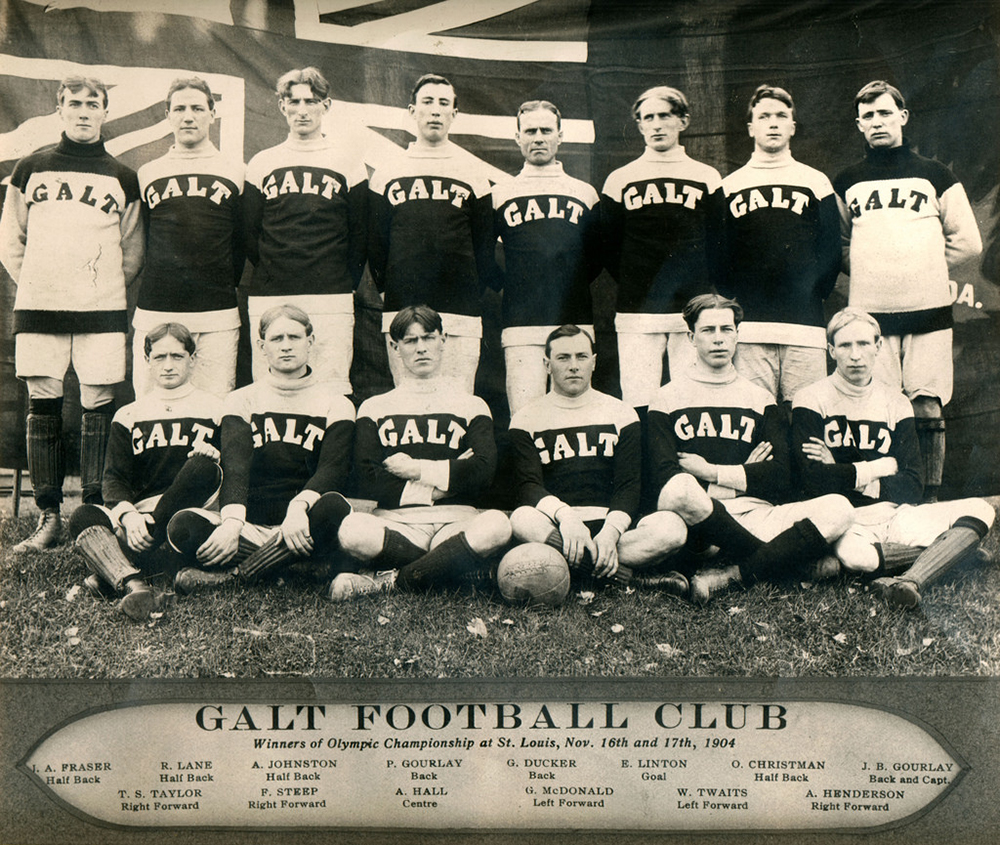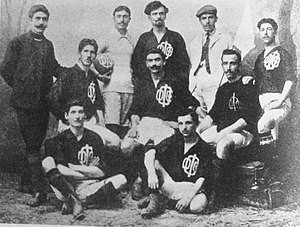OLYMPIC FOOTBALL TOURNAMENTS 1904 – 1906
Picture : GALT FC 1904
1904 – St. Louis
—————————————————————————————————————by IFFHS—
Originally, the 3rd edition of the Olympic Games should have been held in Chicago (in the state of Illinois, on Lake Michigan) on the event of the city’s 100th anniversary. However, the plans of the local organising committee differed from those of the IOC. In the end, also thanks to then president of the USA Theodore Roosevelt, the games were moved to St. Louis (Missouri), which also was celebrating its 100th year of existence in 1904.
This was a not a good choice, though, for the Olympic Games were – once again – eclipsed by the World Fair, which was being held in St. Louis at the same time. They also dragged on from July 1 to October 28, 1904. Since sports contests had a strong national character, college and university tournaments which were being held at the same time attracted far more attention than the Olympic Games. Except for the hosts, only athletes from eight countries participated, and four other countries were represented by athletes living in the USA.
The Olympic Games comprised 15 kind of sports and were held from July to September. The Olympic football tournament was hardly mentioned, given that the European amateurs lacked the funds to take time off from work for several months. At the time, crossing the Atlantic meant a steamship voyage of several weeks. Professional footballers were barred from the Olympics, but they could not have participated anyway because of the league championships. Still the organisers tried to include soccer, as football is usually called in North America, but only found three teams willing to participate: two local teams and Galt FC – from Ontario, Canada.
The essentially demonstrative nature of these matches is evident from the fact that their halves lasted only 30 minutes each and that they were played during the second half of November, long after the other Olympic athletes had left St. Louis on the Mississippi (the river which separates the state of Missouri from Illinois). The Canadian club thus played against two local teams which were utterly irrelevant in US soccer.
The provincial town of Galt (located about 100 km southwest of Toronto) gave their team a heroes’ welcome. Before the players received their medals still in St. Louis immediately after the game on 17th November (by James E. Sullivan, chief of the Department of Physical Culture). Sports historians have repeatedly tried to declare these matches an Olympic football tournament and Canada Olympic winners over the USA. Reality, however, is something else, and this was a Canadian club and two local school teams giving a demonstration of football. An Olympic football tournament requires national teams; and this, as in Paris in 1900, was definitely not the case here.
Following American custom, the two school teams played each other to determine a winner, but the match ended a scoreless draw. Had this been an official tournament, St. Rose School (whose outside left “Tom” Cook broke his leg during the first match and was out of the tournament) would have been runners-up since theirs was the fewer worse goal ratio. However, the next day they met in a local Christian tournament, and this match was considered a replay. As it was, this encounter also failed to produce goals. Thus the two school teams played three matches in the space of four days, all of them with reduced playing times (30-minute halves). The third match was won by the team with the January brothers.
Christian Brothers‘ College outside left John Patrick Lydon (1878-1937) also coached the team and participated at the 1904 Olympic boxing tournament, where he placed third (welterweight). Then 16 year-old goalkeeper Louis John “Turk” Menges (1888-1961) would later go on to become senator of Illinois. Finally, the team also counted the three brothers John Hartnett (1882-1917), Thomas Thurston (1886-1957) and Charles James “Hicks” January (1888-1975). Their opponent, the St. Rose School team, also had a pair of brothers: George Edwin Cook (1883-1969) in defence and Thomas Cook on outside left. Thomas, who was two years younger, broke his leg in the first match.
THESSALONIKI 1906
—————————————————————————————————————————–
1906 – Athens
—————————————————————————————————————by IFFHS—
Greece’s original demand had been to hold the Olympic Games only in Athens. But acting against the wishes of Pierre de Coubertin, several IOC members suggested holding the games every two years, alternating between Athens and a city in another country. After all, the Olympic Games in 1900 (Paris) and 1904 (St. Louis) had had a rather negative effect on the Olympic movement. By ways of a compromise, and on the occasion of the 10th anniversary of the modern Olympic Games, it was agreed to hold them in Athens.
These were contested in 14 disciplines from April 22 to May 2, 1906, although some of the contests were more of a demonstration rather than actual competition. These games were also the first to have an Olympic village, and it was the first time that the athletes were awarded medals. IOC president Baron de Coubertin was again absent, as he had also been from the Olympic Games in 1896 (Athens) and 1904 (St. Louis), and always referred to the 1906 tournament as “interim games”, an attitude which sports historians regard as biased. At least these Olympic Games were a success, and hence a big step for the Olympic movement.
Greece was also serious about organising an Olympic football tournament, but received no entries from any countries other than Denmark. Even from Greece there was but a single entry, the club Ethnikos GS (Athens), which had been bolstered by Alexandros Kalafatis from local rivals Panellenios GS. The club Omilos Filomouson Thessalonike was an association of art lovers from modern-day Thessaloniki (which at the time was called Selânik and part of the Ottoman Empire).
Denmark had entered the Olympic football tournament acting on the private initiative of teacher Carl Andersen. This team, however, was not affiliated with either the “Dansk Boldspil Union” (DBU, the Danish FA) or the “København Boldspil Union”, both of which had other priorities. Carl Andersen (1865-1950) had formed a city team from the remaining players. Denmark did not yet field a national football team at the time.
Finally, a hitherto non-existent team entered under the name “Smyrna”. This was the old name of the city İzmir on the Turkish Black Sea coast, which at the time was populated mainly by Greeks even though it was part of the Ottoman Empire. This team, which was comprised primarily by English and French merchants residing in zmir, included the five Whittals (all related) as well as Zaren Kuyumdzian in defence, who was Armenian. Outside right Donald Whittal also participated at the 1906 Olympic rowing tournament (four with coxswain). All matches were played in the Podilatodromio, originally a velodrome (a stadium with a specially constructed bicycle track) and now called the Karaiskaki Stadium.
The two losers from the first round would contest the third place while the two winners would advance to the final. However, when Denmark reached the final and were leading 9:0 at half-time, the Greeks showed little Olympic spirit and did not appear for the second half. The tournament organisers then caused the next sensation when they decided that the three “Greek” teams would now play off for second place. The Athens club, with the Botasis and the Vrionis brothers as well as the son of Athens mayor Merkouris, refused, having beaten Thessaloniki by a good margin in the previous round. Thus the Athens team was disqualified (irregularly) while the other two teams now played off for second rather than for third place.
This competition cannot be considered an official Olympic football tournament since no national football teams participated, and those teams who did had not been selected by their respective national football associations. These matches which were played in the context of the Olympic “interim games” can only be regarded as private friendlies.

